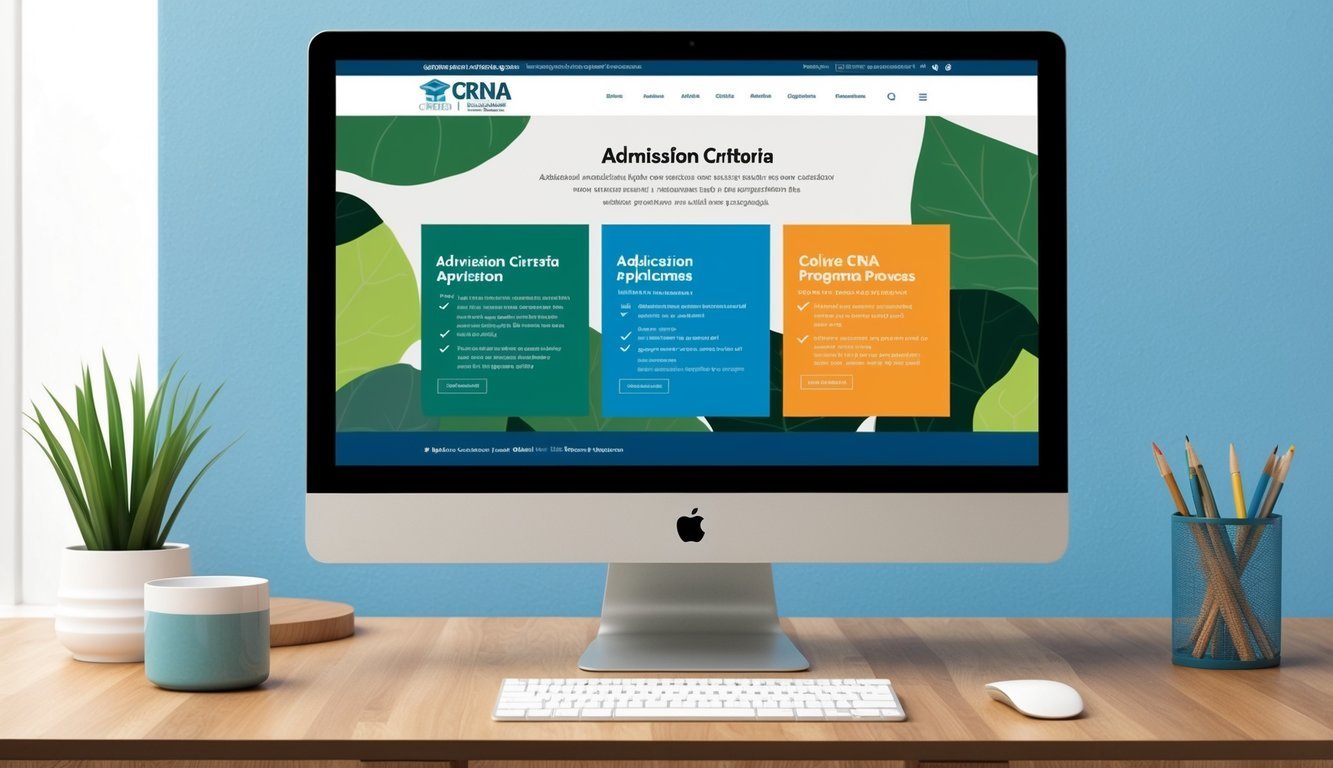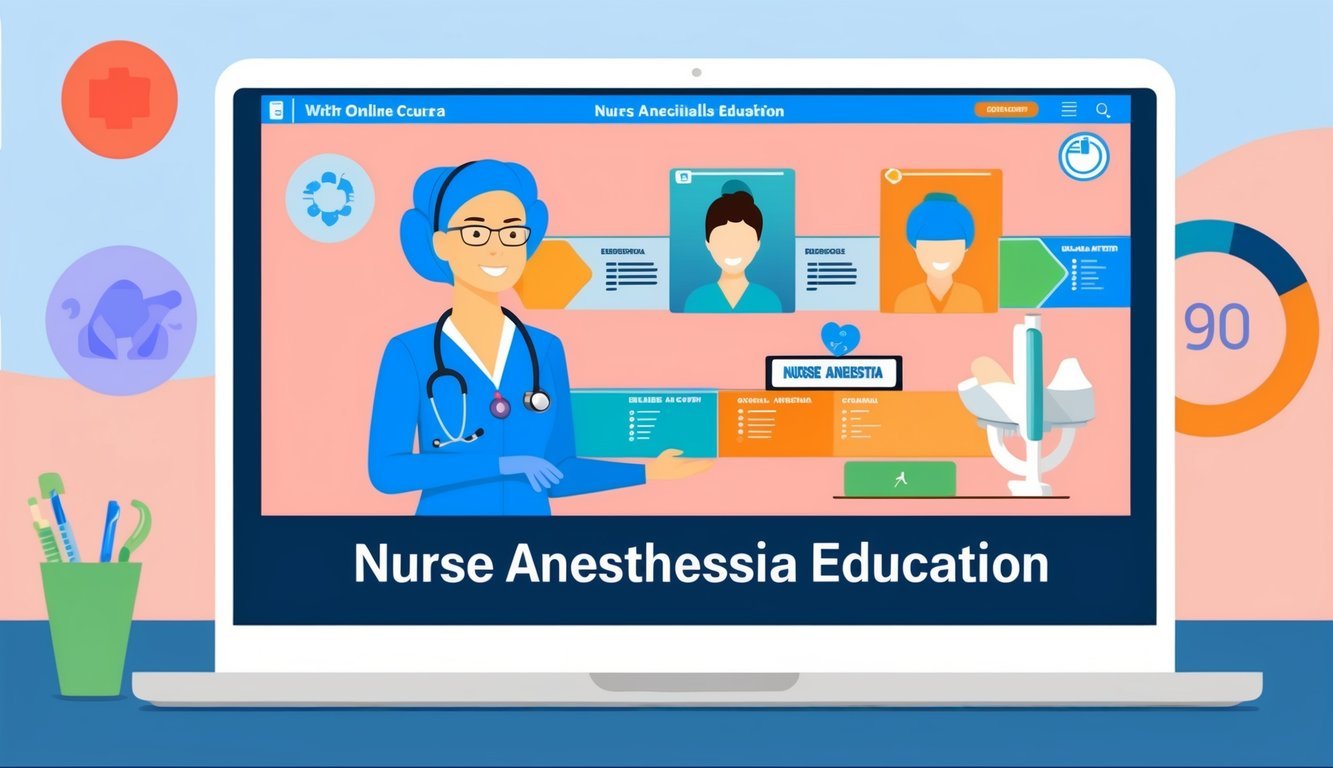Exploring online CRNA programs can significantly enhance your career as a Certified Registered Nurse Anesthetist.
These programs offer a flexible and comprehensive path to becoming an Advanced Practice Registered Nurse specializing in Nurse Anesthesia.
With various options available, you can manage your education while balancing professional and personal commitments.
Most online CRNA programs combine virtual coursework with in-person clinical experiences, allowing you to gain essential hands-on skills.
This hybrid model not only helps you learn from home but also equips you with the practical training needed to excel in the field.
Many accredited programs are designed to fit the needs of working nurses, making the transition into this advanced role smoother.
If you’re considering a career in anesthesia, investing in an online CRNA program could be your next step toward a rewarding career that focuses on patient care and safety in surgical settings.
Visit resources like Nurse.org and EduMed.org for more information on available programs.
Exploring the Field of Nurse Anesthetists
The field of nurse anesthetists offers an opportunity for advanced practice registered nurses (APRNs) to play a crucial role in patient care.
As a Certified Registered Nurse Anesthetist (CRNA), you will provide anesthesia care, educate patients, and manage complex medical situations.
Role and Responsibilities
As a Nurse Anesthetist, your primary role involves administering anesthesia and monitoring patients before, during, and after surgical procedures.
You will assess patients’ medical histories and physical conditions to develop appropriate anesthesia care plans.
Key responsibilities include:
- Conducting pre-anesthesia evaluations
- Selecting and administering anesthetic agents
- Monitoring vital signs and anesthesia levels during surgery
- Providing post-anesthesia care and pain management
You will work collaboratively with surgeons, anesthesiologists, and other healthcare professionals to ensure optimal outcomes.
Being prepared for emergencies and having strong communication skills are essential.
Certification and Licensure
To become a CRNA, you must first obtain an RN license, which requires completing an accredited nursing program and passing the NCLEX-RN exam.
After gaining experience in critical care, you can pursue a master’s or doctoral degree in nurse anesthesia.
Once you’ve completed your education, you must pass the National Certification Examination (NCE) to practice as a CRNA.
Maintaining certification requires ongoing education and adherence to professional standards set by the Council on Accreditation of Nurse Anesthesia Educational Programs (COA).
Bureau of Labor Statistics Outlook
According to the Bureau of Labor Statistics (BLS), the demand for Nurse Anesthetists is expected to grow significantly.
This growth is largely driven by an aging population requiring surgical and pain management procedures.
Projected job growth from 2022 to 2032 is around 20%, much faster than the average for all occupations.
The increasing emphasis on outpatient surgery, where anesthesia care is critical, also enhances job opportunities.
The average annual wage for CRNAs can exceed $200,000, reflecting the specialized skills and responsibilities involved in this nursing career.
Understanding Online CRNA Program Structure

Enrolling in an online CRNA program requires familiarity with its unique structure.
This includes insights into the curriculum, clinical requirements, and the online coursework that prepares you for the role of a Certified Registered Nurse Anesthetist.
Curriculum Overview
The curriculum for an online CRNA program typically blends advanced nursing education with anesthesia-specific training.
You will engage in a Doctor of Nursing Practice (DNP) program, focusing on both theoretical knowledge and practical applications.
Key components may include:
- Core Nursing Courses: These cover advanced pathophysiology, pharmacology, and health assessment.
- Anesthesia-Specific Courses: You will study topics like anesthesia management and patient safety protocols.
Most programs require completion of approximately 45 to 60 credit hours, depending on your previous qualifications.
This comprehensive framework is essential for preparing you for the complexities of nurse anesthesia practice.
Clinical Requirements and Practicum
Clinical requirements vary significantly by program but generally encompass a designated number of clinical hours and practicum experiences.
A typical online CRNA program mandates around 600 to 1,000 hours of clinical practice, often spread across various settings.
- Clinical Hours: You will engage in direct patient care under the supervision of licensed CRNAs, ensuring you develop the necessary skills for your future role.
- Practicum Experiences: These are structured experiences that allow you to apply your knowledge in real-world scenarios. This practical training is crucial for your competency in anesthesia techniques.
Collaboration with local healthcare facilities enhances your clinical training, enabling you to meet the specific requirements of your program.
Online Coursework and Experiential Learning
Online coursework in CRNA programs typically employs a hybrid model, combining online and on-campus learning.
You’ll take advantage of digital technologies to access lectures, engage in discussions, and complete assignments at your convenience.
Key aspects include:
- Flexible Format: Most programs allow you to balance coursework with your professional and personal commitments.
- Experiential Learning: Many programs incorporate simulation labs where you can practice skills in a controlled environment. Such hands-on experiences enhance your learning and prepare you for clinical duties.
Courses often emphasize evidence-based practice and critical thinking, vital components for your success in the field.
Check programs like Nurse.org or EduMed.org for detailed structures and requirements.
Admission Criteria and Application Process

Understanding the specific admission criteria and application process for online CRNA programs is essential for prospective students.
These programs generally require a combination of educational qualifications, work experience, and comprehensive application components to evaluate candidates thoroughly.
Educational Prerequisites
To apply for a CRNA program, you typically need a bachelor’s degree in nursing or a related field.
You must hold a valid and unencumbered RN license.
Some programs may also accept degrees in other healthcare-related areas, but a nursing background is most common.
Many programs require candidates to have a Master’s degree or a Doctor of Nursing Practice (DNP) in nurse anesthesia.
Additional coursework in advanced pharmacology, health assessment, and pathophysiology may also be necessary.
Be mindful that programs may vary in their educational prerequisites.
It’s crucial to check specific requirements for each institution.
Work Experience Requirements
Most CRNA programs mandate a minimum of one year of critical care experience.
This experience can come from working in settings like ICUs, ERs, or other high-acuity areas where you manage patients with complex medical needs.
A background as an Advanced Practice Registered Nurse (APRN) may strengthen your application, but it isn’t universally required.
Candidates often reflect on their clinical experiences to showcase their suitability for the program.
Check additional work experience expectations directly from the institution, as they can influence your acceptance into the program.
Review of Application Components
Your application typically includes several essential components:
- Transcripts: Official academic records demonstrating your educational history.
- Letters of Recommendation: Usually, two to three professional and academic references are required.
- Personal Statement: A narrative explaining your motivation to pursue a career in nurse anesthesia.
- CV/Resume: An updated document summarizing your professional experience and qualifications.
It’s advisable to meticulously review the institution’s guidelines for each component.
This careful preparation can significantly boost your chances of acceptance.
Make sure to submit your application before the deadline, as late submissions may lead to rejection.
Always confirm if you meet all admission criteria, as this varies widely across programs.
For detailed guidance, consider visiting AANA for additional resources.
Key Components of Nurse Anesthesia Education

Nurse anesthesia education comprises critical components that equip you with the knowledge and skills required for safe anesthesia practice.
It involves a deep dive into pharmacology, pathophysiology, principles of care, and research methodologies.
Anesthesia Pharmacology
Understanding anesthesia pharmacology is essential for effective practice.
You will learn about various anesthetic agents, their mechanisms, and their effects on the body.
Topics covered include:
- Types of Anesthetic Agents: General and local anesthetics, sedatives, and analgesics.
- Pharmacokinetics and Pharmacodynamics: Absorption, distribution, metabolism, and excretion of drugs.
- Patient Safety: Preoperative assessments for potential drug interactions and allergies.
This knowledge is crucial for managing patient safety and optimizing outcomes during surgical procedures.
Pathophysiology and Anesthetics
A solid foundation in pathophysiology helps you understand the physiological consequences of anesthesia on different health conditions.
You will explore:
- Disease Processes: How various diseases, such as diabetes or cardiovascular disorders, affect anesthesia.
- Impact of Anesthesia on Physiology: Respiratory, cardiac, and neurological implications.
- Patient Assessment Techniques: Evaluating comorbidities to tailor anesthesia plans.
This understanding is vital to minimizing risks and ensuring patient safety during the administration of anesthesia.
Advanced Principles of Anesthesia Care
Advanced principles encompass comprehensive approaches to anesthesia administration.
Key areas of focus include:
- Anesthesia Techniques: Regional versus general anesthesia and when to use each.
- Intraoperative Management: Monitoring vital signs and responding to adverse events.
- Multidisciplinary Collaboration: Working with surgical teams to ensure cohesive patient care.
You will also engage in simulations to refine your practical skills in anesthesia techniques and patient management.
Evidence-Based Practice and Research
Incorporating evidence-based practice into anesthesia education prepares you to utilize research findings for better decision-making.
Key elements include:
- Research Methodologies: Understanding qualitative and quantitative research designs in nursing.
- Critical Appraisal of Literature: Evaluating research studies for applicability to practice.
- Application in Clinical Settings: Implementing best practices to improve patient outcomes in anesthesia care.
Engaging with ongoing research ensures that your practice is grounded in the latest scientific evidence, reinforcing patient safety and effective pain management.
These components collectively cultivate your expertise as a future Certified Registered Nurse Anesthetist, ultimately contributing to improved patient care and outcomes.
Accreditation, Certification, and Post-Graduation Outcomes
Accreditation and certification are vital components of your journey to becoming a Certified Registered Nurse Anesthetist (CRNA).
Understanding these elements, along with potential career outcomes, can significantly shape your path in this demanding field.
Accreditation Standards
The Council on Accreditation of Nurse Anesthesia Educational Programs (COA) sets the standards for accrediting nurse anesthesia programs in the United States and Puerto Rico.
Accreditation ensures that the program meets specific academic criteria, maintaining quality education and preparing you for clinical practice.
To pursue CRNA programs, look for institutions that hold COA accreditation.
Programs may vary, but accredited schools offer MSN or doctoral degrees, including Doctor of Nurse Anesthesia Practice (DNAP).
Attending an accredited program is crucial for your eligibility for certification examinations.
National Certification Examination
After completing your nurse anesthesia program, you must pass the National Certification Examination (NCE).
This rigorous exam is administered by the National Board of Certification and Recertification for Nurse Anesthetists (NBCRNA).
The NCE tests your knowledge in various areas, ensuring you’re equipped to work in critical care settings.
Passing this exam is mandatory to obtain your CRNA license, allowing you to practice professionally.
Preparation resources, like practice exams, workshops, and study groups, can increase your chances of success.
Career Opportunities and Salaries
Upon certification, you will have many career options.
CRNAs work in various healthcare settings, including hospitals, outpatient surgical centers, and pain management clinics.
Recent data shows that CRNA salaries can range from $150,000 to $250,000 annually.
The salary depends on factors such as location, experience, and work setting.
Major cities often offer higher salaries due to increased demand.
Many CRNAs specialize in areas such as pediatric anesthesia or pain management.
This can enhance your career prospects and earning potential.

